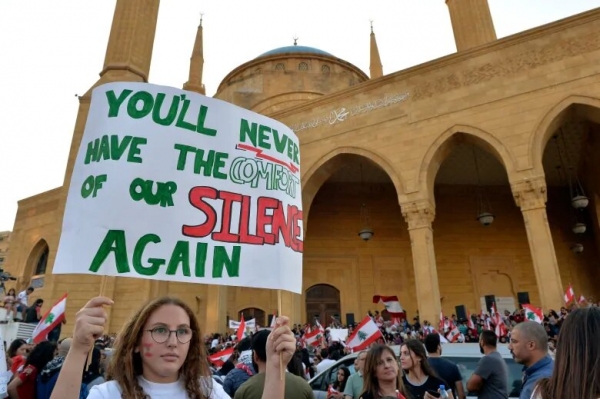1) Lebanon
On 17th October 2019, anti-government demonstrations peacefully began in Beirut as a result of the government’s announcement of new taxes, including on the messaging application WhatsApp, which it revoked hours later due to popular outrage. However, protests gradually grew across the country and soon devolved into expressions of anger against the entire political establishment, with thousands of protesters gathering across the city, decrying what they called the government’s corruption and economic mismanagement and asking for its resignation.
Government’s reaction was thus fast and violent. The Internal Security Force harshly responded by firing tear gas and rubber bullets at thousands of largely peaceful protesters, including children. According to Human Rights Watch (HRW) Lebanon’s security forces used excessive and unnecessary force against protesters in downtown Beirut on 18 October 2019. In this regard, it is worth mentioning that, according to the United Nations basic principles, law enforcement officials may only use force “when strictly necessary.” Should they use force, they must exercise restraint and ensure any use of force is proportionate. If security forces cause serious injuries, there should be an independent investigation leading to prosecutions, if the use of force is found to be unlawful.
Following 5 days of protests, Lebanon's government has then approved a package of economic reforms. Measures include slashing politicians' salaries by half, giving financial help to families in poverty, abolishing several state institutions, passing a law to establish an anti-corruption committee by the end of the year, drafting a law that seeks to restore stolen public funds. However, the raft of reforms announced by Prime Minister Hariri did not go far enough for some protesters. They still call for the resignation of the government, who they accuse of widespread corruption.
To know more, please read:
https://www.hrw.org/news/2019/10/19/lebanon-security-forces-use-excessive-force-against-protesters
https://www.aljazeera.com/news/2019/10/lebanon-protests-latest-updates-191021080734203.html
https://www.bbc.com/news/world-middle-east-50118300
2) Cambodia
On 16th August 2019, a group of former members of the Cambodian National Rescue Party (CNRP) announced that the exiled party leader Sam Rainsy and others planned to return to Cambodia on 9th November. Since then, Cambodian authorities, labelling this plan to return a “coup”, have wrongfully arrested dozens of people and the Government is currently holding nearly 60 political prisoners throughout the country.
In particular, more than 50 former CNRP members have been charged with crimes and 31 have been jailed. Among the charges routinely being filed are plotting against the state, incitement to commit a felony, and discrediting judicial decisions – all of which appear to be baseless and politically motivated.
Three police officers in Kampong Cham province’s in Batheay district arrested CNRP activist Dong Sovannarith at the beginning of October and brought him for questioning at the provincial police headquarters. The arrest was likely politically motivated because of Dong Vannarith’s association with the CNRP, which Cambodia’s Supreme Court dissolved in November 2017 for its role in an alleged plot to topple the government. “He was arrested for exercising his right to the freedom of expression, which is protected under Cambodian law,” said Ny Sokha, the head of Cambodian rights group Adhoc.
In light of these events, HRW, while launching its updated webpage of political prisoners, urges the Cambodian government to immediately cease arresting and detaining former opposition party members and rights activists for exercising their basic rights.
To know more, please read:
https://www.hrw.org/news/2019/10/20/cambodia-wave-opposition-arrests
https://www.hrw.org/video-photos/interactive/2019/10/20/political-prisoners-cambodia
https://www.rfa.org/english/news/cambodia/arrests-10012019182632.html
3) Iraq
Violent clashes between protesters and security forces are also taking place in Iraq. In particular, the International Committee of the Red Cross (ICRC) reports that the deaths of civilians, as well as the growing number of wounded persons at the ongoing protests across Iraq is exceptionally worrying, as is the use of firearms for restoring public order.
The country has been rocked by days of protests against corruption, unemployment and poor public services. Security forces have responded using water cannon, tear gas, live rounds and rubber bullets. As a result, scores of protesters have been killed and thousands wounded. Aljazeera also reports that the state imposed a near-total telecommunication shutdown in most regions, severely limiting press coverage and transparency around the ongoing crisis.
Following these events, Iraqi President Barham Salih publicly condemned attacks on both protesters and the media, urging security forces to preserve the rights of all Iraqis. "The right to protest and freedom of expression are guaranteed by the constitution," he said. Ritz the ICRC's head of delegation in Iraq, also remarked that "the use of force by security forces must be proportionate to the situation and is an exceptional measure […] firearms and live ammunition must only be used as a last resort, and to protect against an imminent threat to life”.
Iraq's authorities should "immediately end the unlawful blocking of access to the internet and allow protesters to assemble without fear of repercussion", comments global rights group Amnesty International. "We will continue to closely monitor the situation" the organization said.
To know more, please read:
https://www.icrc.org/en/document/violent-protests-across-iraq-escalate-icrc-calls-restraint




